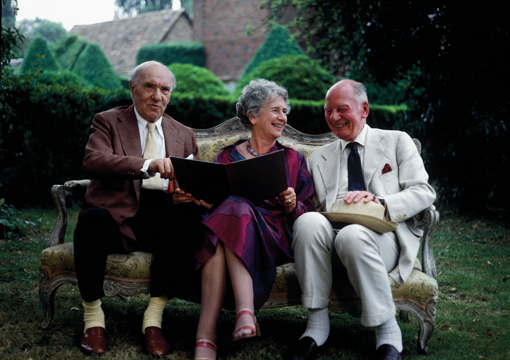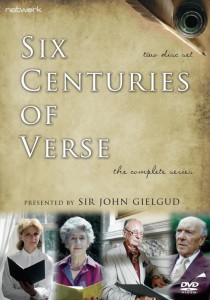Six Centuries of Verse
2013. GB. 2 x DVD. 400 minutes. Network Distributing. Certificate E. Price: £19.99
 About the reviewer: Dr James McGrath lectures in Cultural Studies at Leeds Metropolitan University. His poems appear in various literary magazines. James’s first academic book, The Naming of Autism, considers the changing social, cultural and medical meanings of ‘high-functioning’ autism in relation to adult identities. This will be one of the first extended studies of autism from an interdisciplinary Humanities perspective, and will be published by Rowman & Littlefield International in 2016 (he discusses the book in this video). Previously, James has previously published on the work and relationship of John Lennon and Paul McCartney (the subjects of his PhD), as well as on Asperger’s Syndrome and literary theory; disability and poetry; working-class avant-garde culture; Emily Brontë; Walter Benjamin; R. S. Thomas; Richard Hoggart; Lord Woodbine; U. A. Fanthorpe; Bob Dylan; Joy Division; The Durutti Column; U2; and The Smiths. James is interested in the relationship of Literary Studies to other fields, and has also taught History, Creative Writing, Music, Media, and Journalism at university level.
About the reviewer: Dr James McGrath lectures in Cultural Studies at Leeds Metropolitan University. His poems appear in various literary magazines. James’s first academic book, The Naming of Autism, considers the changing social, cultural and medical meanings of ‘high-functioning’ autism in relation to adult identities. This will be one of the first extended studies of autism from an interdisciplinary Humanities perspective, and will be published by Rowman & Littlefield International in 2016 (he discusses the book in this video). Previously, James has previously published on the work and relationship of John Lennon and Paul McCartney (the subjects of his PhD), as well as on Asperger’s Syndrome and literary theory; disability and poetry; working-class avant-garde culture; Emily Brontë; Walter Benjamin; R. S. Thomas; Richard Hoggart; Lord Woodbine; U. A. Fanthorpe; Bob Dylan; Joy Division; The Durutti Column; U2; and The Smiths. James is interested in the relationship of Literary Studies to other fields, and has also taught History, Creative Writing, Music, Media, and Journalism at university level.
… The series was instigated and presented by John Gielgud
For anyone debating the relationship between Literature and Media Studies, the 1984 Thames Television series Six Centuries of Verse, now on DVD, is noteworthy. Written and compiled by poet and critic Anthony Thwaite, it comprises sixteen half-hour episodes and remains among the most substantial poetry broadcasts to date on commercial television. It was shown to broadsheet acclaim in Britain, Canada and Australia.
The series was instigated and presented by John Gielgud. Over seventy poems across the series are recited by actors including Gielgud, Peggy Ashcroft, Anthony Hopkins, Ian Richardson, Gerrard McAuthur and Lee Remick. Episodes combine standard syllabus texts with related, lesser-known poems.
Chaucer, Shakespeare, Milton and Wordsworth receive full episodes. Other instalments focus on Old English poetry; the Medieval to Elizabethan period; the Metaphysicals; and the Restoration. Two episodes focus on the Romantics and three on late nineteenth-century poetry in England and America. Eliot’s The Waste Land dominates the penultimate instalment, though commentary on Modernism as concept or movement is vague. The seven-hour series devotes just ten minutes to poets alive in 1984: Philip Larkin (then aged 62) and recently-appointed Poet Laureate Ted Hughes (54), though the poems used were already decades old. Thwaite’s descriptive narrative is characteristically eloquent. Sometimes, such as when commenting on Shelley’s ‘Masque of Anarchy’, it is more stirring than most recitals.

If considering this DVD for classes, note Gielgud’s introduction: the series presents poetry not through ‘lessons’ but ‘a series of entertainments’. The emphasis is more theatrical than literary. Subtitles – absent from review copies – could have shown how stresses and line-endings are handled by professional readers. As it is, the actors play the craft of verse-recital close to their chests (literally), clutching the poems in neat folders, leaving texts invisible. The performances, while dramatic, seem unlikely to demystify poetry as a form that many find intimidating.
 It may have helped if the 2013 repackaging reflected the current waning of reference or deference to the British honours system. Subsequent to the original broadcast, numerous actors featured here became knights or dames. The foregrounding of this in promotional materials reinforces the sense of this series as a production which – while aimed at a general audience – presents poetry in a fashion so elitist that it borders on cultural assault.
It may have helped if the 2013 repackaging reflected the current waning of reference or deference to the British honours system. Subsequent to the original broadcast, numerous actors featured here became knights or dames. The foregrounding of this in promotional materials reinforces the sense of this series as a production which – while aimed at a general audience – presents poetry in a fashion so elitist that it borders on cultural assault.
Episodes begin with Gielgud in a private library, perusing leather-bound volumes. The performance locations rarely diversify beyond Chastleton House (Oxfordshire), Farnborough Hall (Warwickshire) and Beckley Park (Oxfordshire), though Wordsworth’s Dove Cottage features in the episode on the Cumbrian poet – whose democratic literary ideals in Lyrical Ballads receive less attention than his later life as a reactionary Poet Laureate. When, illustrating Robert Lowell’s verses, American scenes of carparks and construction sites are shown, the implication is that nothing comparably deprived exists in England.
There is little about Six Centuries of Verse that does not appear stiffly conservative. Successive Poet Laureates are referenced as if the role marks the summit of creative worth. Most recitals, filmed around cloisters and gardens of country houses, feature white men bellowing in Received Pronunciation. What is most problematic about Six Centuries of Verse is not the fact that poetry in English has been dominated by privileged white men; the problem is the critical oblivion to this fact throughout the series. Elizabeth Barrett Browning and Christina Rossetti are introduced respectively by reference to husband and brother. The final episode (‘Towards the Present: 1934-84’) mentions no female British poets. Shifting to America, it ignores Langston Hughes, Gwendolyn Brooks and Maya Angelou. Lowell’s ‘For the Union Dead’ (1960) – introduced with mention of the Black infantrymen ‘who fought under the command of their white officer’ – is the nearest Six Centuries of Verse comes to representing Black voices.
Despite the gigantic talents involved, this 1984 production can at best be described as archaically whimsical. Still, for anyone wanting escapist entertainment through falsely antiquated notions of poetry and society, this DVD is peerless. And there’s definitely plenty to discuss.
Dr James McGrath lectures in English and Media at Leeds Metropolitan University.
 Learning on Screen
Learning on Screen